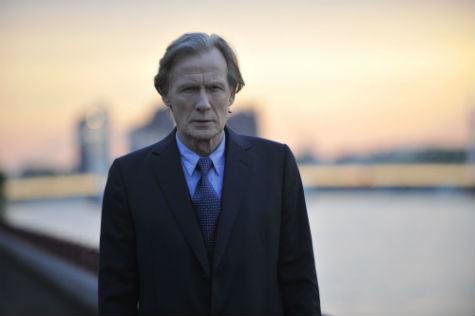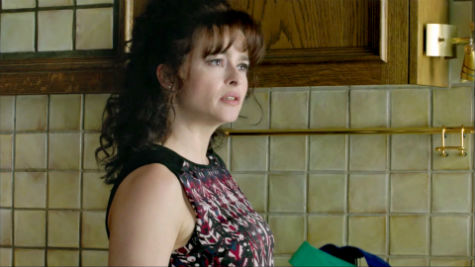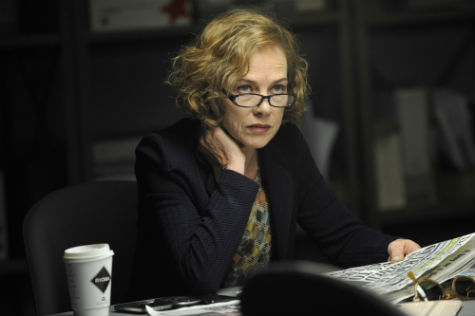
Worricker (Bill Nighy) is on the run, now in Germany with ex-spy, ex-love Margot (Helena Bonham Carter) by his side. They’re stirring the embers of their faded romance and recalling all the quirks and peccadilloes they once found so endearing. (He doesn’t wash the lettuce properly! How adorable is that?) They live out of suitcases, yet seem to wind up nattily attired in some snazzy digs. It’s all a lark, really.
Still, Margot longs to return to England. And Worricker’s daughter (Felicity Jones) is due to give birth any moment, which gives him a reason to pine for home as well. This poses a dilemma. Going home would place them in the way of Prime Minister Alec Beasley (Ralph Fiennes), whom Worricker has embarrassed with accusations of financial and ethical impropriety.
Meanwhile, Worricker’s old colleague in the spy game Jill Tankard (Judy Davis) is performing all sorts of machinations that confirm the primary thesis of the Worricker series: The intelligence services run everything.
Salting the Battlefield, the final episode in the Worricker Trilogy on Masterpiece Contemporary, picks up some time after Turks & Caicos. It’s as unnecessarily complicated as the first two episodes, and as it takes us back to most of the players and activity in Page Eight (Part 1) it makes even less sense if you haven’t watched the trilogy from the beginning.
When we last saw Johnny Worricker and Margot Tyrrell, they were boarding a fishing boat in the Caribbean, two fugitives heading underground. Somehow they’ve made their way to Europe. (Surely not on that fishing boat.) Now they’re bouncing from place to place, designer luggage in hand, one step ahead of the secret service agents trying to track them down.

So the PM, who sleeps with a biography of Margaret Thatcher on his bedside table, has connections to unsavory characters. Why would an experienced old spy like Worricker, who’s spent a career digging through the proverbial underwear of all sorts of people in high places, find this particularly outrageous? Surely, he’s encountered such things before.
Case in point: Deputy Prime Minister Anthea Catcheside (Saskia Reeves) is married to a guy who’s involved in some sort of bribery scandal with Ukraine. Why doesn’t that outrage Johnny? (This is not a question worth answering, apparently.)
It’s all very stylish and urbane—not, I would add, witty or realistic—but in the end Salting the Battlefield doesn’t succeed in making the scintillating and “profound” (to use writer/director David Hare’s word) statement it’s supposed to make.
We have a corrupt and largely incompetent secret service with an agenda, formulated by Jill Tankard, that appears to begin and end with bringing down the prime minister. This is puzzling because the prime minister, from what we can tell, is popular, successful, and supportive of the country’s intelligence activities. In fact, he’s responsible for Jill Tankard being in the position of power she now enjoys.
We have a prime minister who wants to fight terrorism through the efforts of the intelligence services. He also wants to catch Johnny Worricker, who reneged on a promise he made at the end of Page Eight. “What do we do when we’ve caught him,” he posits. “Getting him’s the easy bit. It’s what we do with him then…” Hint: It might involve sitting Worricker down and giving him a stern talking-to about political ideology.
We have Worricker, whose talents include strolling up the gangplank of a ferryboat while carrying two cases of wine in one hand. (Sorry, but that made me laugh.) He claims he’s not trying to bring down the government, merely trying to throw some light on the prime minister’s activities. He refuses to “be silent about lawlessness,” which sounds swell until you realize that all he’s really lighting is the path for the MP with the dodgy husband to become prime minister.
And the vessel Worricker has chosen to carry his light to the public is a powerful newspaper editor (Olivia Williams), who doesn’t appear to read or even know about what’s in her paper until after it’s published.
The cast, as always, is stellar. (No one does tough-as-nails like Judy Davis. I love her.) The story, not so much.

As Stirling Rogers (Rupert Graves) says, “Some rogue MI5 agent with a file? Is that what the prime minister of Great Britain should be worrying about first thing in the morning?” Absolutely not, if you ask me, but no one asked me.
Viewer reaction to the Worricker Trilogy seems to be mixed, with universal adoration for Bill Nighy and lukewarm response to the story itself. What’s your opinion?
Leslie Gilbert Elmanis the author of Weird But True: 200 Astounding, Outrageous, and Totally Off the Wall Facts. Follow her on Twitter@leslieelman.
Read all of Leslie Gilbert Elman’s posts for Criminal Element.

I was willing to give it the benefit of a doubt. The cast could make a dodgy script riveting for me anyway. What I took to be a “happy ending” rang a bit false, though, with Davis and Nighy warmly chummy again and satisfied with how everything has turned out, the new PM apparently in their pocket and Nighy eager to return to his old job.
I agree. Without spoilers I’ll just say the trilogy took an awfully long route to reach this particular ending.
Wonderful acting poor ending. Johnny had courage and quiet integrity along with faults. Yesterday he stayed the course as few were willing. The ending was clear as mud. Did he return to save Margot and his daughter. Or did he sell out? If he did it for them and was realistically hoping to influence MI5 more by being one of them then Margot leaving and his daughter being estranged leaves one feeling like the entire trilogy was an empty experience of no good deed goes unpunished. If Margot truly loved him and knew him she would have stayed. He is the true hero in a world of difficult choices. Torture is never needed Iraq did not cause 911 and large countries cannot be allowed to commit state murder on a grand scale
The point of the story is that Johnny will not tolerate England being morally weak.
Johnny Warricker is glad to hear Jill’s logic … until she indicates how she had reacted to the original material that launched the show…”I saw the evidence”… followed by “it will bring him down.” She wasn’t appalled by the collaboration with torturers, she was doing the math and realized that the Prime Minister was not going to be in place once the story broke.
This put him on the outside. He can’t collaborate. He knows he can’t trust Jill. He loved the past but he’s now living in the present. There’s new life in his world and he’s resolved to particpate in it.
It was a fine movie, but the only thing that bothers me it’s that, the main couple (Johnny and Margot) doesn’t end up together.
He is an old man, alone with just one or two friends, and he is troughing up the only relation that have sense?
I think that this movie could end with a beaty ending without loosing meaning.
Well, interesting review and comments I would have to say. I just saw this triology, so I may be a bit late. As for the plot, there have been a few references in the spirit of “clear as mud”. I would say “crystal clear”. I always say this series as something where the plot and the spy agency
machinations were meant to be obvious, and the sly script and production with British elite actors as mere spice. It seems I was wrong.
Is there a woman this series NOT attracted to Johnny? I think all this these women insinuations regarding Worricker being such a sex bomb particularly silly. There is nothing Bond about this series, so all of that is just wasted energy. It certainly does nothing for the plot except repel every feminist unlikely to tune in.
With all that said, it is still very entertaining in a very British way, and I enjoyed it very much, calling it a masterpiece would be a stretch.
I am working on next episode, Herkos Odontoon.
Throughout the series, the principle characters express their meaning entirely through indirection: what is really meant can only be inferred by other listeners in the scene (and the viewer). The indirection, the constantly implied but never stated, permits the speaker later to deny his former utterances or to give them an entirely different meaning. All is in shadows (as is frequently reinforced in the lighting of many scenes). In such a world, human relationships have no foundation, and neither do honor, truth as is seen as the series unfolds.
That Worricker would be so troubled by torture seems implausible; surely in his many years he has seen many people, even nations, destroyed by the machinations of the secret services and by means more violent and horrifying than the torture of individuals.
But I grant the premise. And throughout the series, I, as viewer, was supposing that as Worricker’s attempted to draw a line in the sand he was finally facing, slowly, how corrupt and corrupting intelligence agencies are. His scene in episode three with Rollo at 1:18:10 reveals his realization, or very strong suspicion, that he himself has been used, manipulated by “hidden hands” all along. (Again: the world of shadows.) This “hand” seems to be Jill Tankard in the final scene Johnny has with her. Jill mouths platitudes regarding democracy, “will of the people”, all the time reserving the right to “correct” the people when needed. Johnny has sacrificed relationships with his daughter, prior wives/lovers, and essentially any life outside the “Service” and all for naught. As if any more evidence was needed, at 1:27:17 of episode three Margot says: “Johnny, you know these people. They slide around, they have nothing solid.” Margot sees clearly how unreformable the services are, how corrupted, degenerate the people in it are.
But Johnny, although he makes a deal that allows Margot and Julianne go free, also ensures himself a place again at MI5. (There was no other deal possible??) It is what he really wants, more than Margot. He tries to push the moral decision onto her at 1:26:50 with his line about “promises”. He knows which way is honor, but feels more strongly the temptation of living in the world of shadows. He is lying to himself, but Margot, sadly but wisely, does not absolve him of his own moral responsibility.
Perhaps Johnny is a tragic figure, but I see him as corrupted and careerist as Anthea Catchside: they know the truth, but opt to further career instead, in Johnny’s case at the expense of his relationship with Margot (as was with his daughter, Julianne). In this, her condemnation of her father toward the end of the episode is fully justified.
There are bonus featurettes in which the director and various actors try to talk up the idealism of the Trilogy. But the resolution of the final episode with the collapse of the hero shows nothing but hopelessness, nihilism, and utter human isolation. Perhaps in this way the production is only emphasizing the fatigue and degeneration of English society (and by extension, all of Western Civilization). They may have a point. At any rate, the Worricker Trilogy is not solution, but only a continuation and “celebration” of the decline of the West. Such a well-acted, well-scripted, and thoroughly disappointing drama.